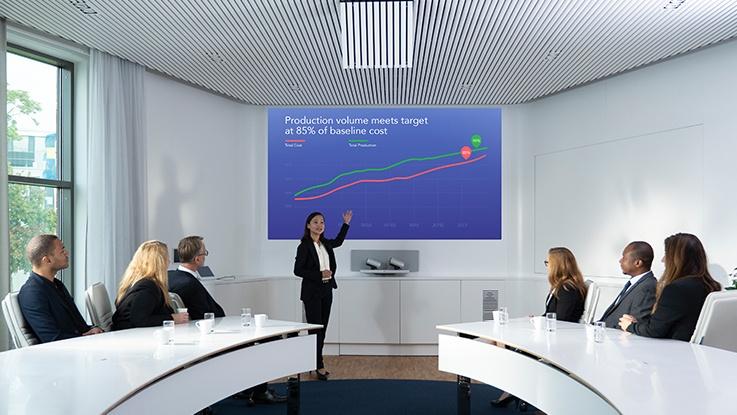Changing the World Is Good Business


By Jennifer Weston-Murphy
The Fortune 2018 Change the World list features 57 companies that are doing well by doing good. These businesses are trying to fix big problems and make money while doing it. That’s right, it’s not a list about charity (though many of these companies also have charitable efforts). It’s about how business—one of the most scalable and sustainable engines we know of—is using its resources and expertise to tackle the biggest challenges. In recent years, more companies are taking steps to try to solve large-scale social issues; it’s a trend that’s not likely to slow down.
And people increasingly want and expect to see business playing this role. According to the 2018 Edelman Trust Barometer, the annual trust and credibility survey by PR firm Edelman, “By nearly a two-to-one margin, a company is trusted to take specific actions that both increase profits and improve economic and social conditions.” In other words, making money and doing good are no longer at odds, and it’s not just the people who work in business who believe this anymore. The public now believes it, too.
The 57 companies on the Change the World list, of which 22 are part of CECP’s coalition, come from 19 countries. Reliance Jio is headquartered in India and first on the list. The telecom company has made owning a smartphone a lot more affordable for millions of people in India and beyond, dropping the average cost of one gigabyte of data from $2.88 to as low as 4¢ per GB. The business is growing at a fast clip. Reliance Jio has gained 215 million subscribers in just 22 months. Nothing short of impressive is the fact that Reliance Jio has found a way to get internet access into the hands of millions who can now finally engage in the virtual economy. People are tapping into digital resources and a marketplace that will almost certainly change their lives and that of future generations.
Also in the top five is Chinese tech company Alibaba Group, whose “poverty alleviation map” feature draws travelers into rural towns and lets them know which facilities are operating. The tool helps local shops establish an online presence and attract customers. Creative solutions like this one make business sense, and it’s in line with what we’ve seen at CECP. We speak with more than 100 companies per quarter, and we’ve seen many innovative examples of how companies are using their business expertise to address social challenges—so much so that we’ve started to track those stories in our annual Investing in Society data release.
CECP has been capturing how big companies address social problems for nearly two decades. Since 2001, our annual Giving in Numbers research has focused on what, when, where, and how companies are investing in their communities. The 2018 edition will be released later this month. Our hope from the beginning was for people—those inside and outside of companies—to see the momentum developing among companies to address social problems through their business and to grow our understanding of how we could use those insights to harness the power of business to do even more for society.
Doing well and doing good are not mutually exclusive, and the companies on the Change the World list prove that.
Previously posted on CECP's blog and 3BL Media news.
Resilience in the Face of Global Warming


By Erik Mohn, Scheider Electric
Organizations need resilience in the face of an increasingly broad and unpredictable risk landscape. This is especially true when it comes to energy and sustainability. Investors and customers alike recognize the effects of climate change and related weather events. And the pressure these and other groups are applying to drive change can no longer be ignored.
One risk that is particularity salient for companies is global warming and resource scarcity, as environmental changes inevitably affect some facet of every business’s operations.
What’s the risk?
Global warming, extreme weather events, and resource scarcity trends are interconnected. They combine to amplify risks for future food, water and energy demands. Consider:
- Extreme weather caused by climate change impacts the seasonal availability of water and intensifies both flood cycles and droughts. This, in turn, reduces agricultural productivity and causes global food production to decrease by 2% for every decade of warming.
- The energy needs and costs of raw material extraction are becoming more acute. Consequently, price volatility levels for metals, food and non-food agricultural output in the first decade of the 21st century were higher than any single decade in the 20th century.
These pressures are set to intensify over the decade as the impacts from global warming and resource scarcity increase, and the demand for food, water and energy grows. Investors and consumers are also demanding more transparency from companies. Global asset manager Aviva Investors recently warned more than 1,000 companies that they face shareholder backlash if they fail to publicly disclose the risks climate change poses to their business models.
What’s the impact?
Global warming and resource scarcity will affect companies in many ways:
- Physical impacts, such as an increase in raw material costs, resource scarcity or asset damage caused by extreme weather. These impacts can also affect company employees and consumers, because of the potential for loss of life or property from fires and floods, or through increased rates of disease. Physical impacts often carry direct financial implications that can be significant.
- Systemic impacts, such as required changes in governance, policies, technology, regulations, organizational design, organizational purpose or the marketplace to address climate change mitigation and adaptation.
- Behavioral impacts, such as changes in consumer demand and buying behavior, employee and community health and well-being, and population fluctuations caused by human migration.
What’s the solution?
There are pragmatic, tangible strategies organizations can deploy, such as scenario modeling, to help evaluate climate-related risks across the value chain. The Task Force on Climate-related Financial Disclosures (TCFD) has developed a framework to help organizations identify and disclose those risks that are most material to their business.
Recommendations to build resilience against the effects of climate change and resource scarcity:
- Embrace Active Energy Management (AEM). Align energy efficiency, sustainability and energy supply goals, data and strategies to increase collaboration across teams.
- Make sustainability core to business strategy and reduce global resource consumption by:
- Implementing efficiency measures and software to maximize and measure reductions in resource consumption.
- Committing to, and implementing, a carbon reduction target through the Science-Based Targets Initiative.
- Actively disclosing emissions and water consumption data to CDP.
- Setting an aggressive target for renewable energy purchasing, such as 100% renewable electricity, and using large-scale procurement to rapidly advance towards this goal.
- Integrating circular economy practices that reduce waste and maximize use of raw materials.
- Exploring distributed energy resources, such as battery storage, CHP and microgrids to increase power resiliency.
- Use a climate model like the one available from TCFD to identify potential business risks and increase transparency. Of note: TCFD recommendations are now incorporated in the credit scores of S&P Global Ratings.
- Watch changing legislation in global markets. For instance, France’s Article 173 climate-reporting law requires institutional investors and asset managers to disclose how their business strategies cover climate change.
Previously posted on Schneider Electric's blog and 3BL Media news.
Minting the Legacy of a Family-Owned Company


For the world’s largest food and beverage companies, the push for a more responsible and sustainable supply chain is as much about long-term survival as it is about addressing current concerns expressed by investors and other key stakeholders.
Yet much of the conversation about sustainable food usually centers on ingredients such as cocoa, coffee, soy, palm oil and beef.
Mars, Inc., however, points to one ingredient that epitomizes the company’s drive to scale impact where it can to secure a healthy planet and thriving farming communities: mint.
So why mint?
Mint is an essential flavoring for many of Mars’ products, as the company says it uses the ingredient in 65 percent of gum and candy products across 15 brands. Those names include Altoids mints as well as Wrigley, Extra and Orbit chewing gums. The millions of consumers who buy Mars’ products – and have for generations – help keep thousands of farmers in the U.S., Canada and India employed. And those family farmers contribute to a mint industry that is worth at least $700 million worldwide.
But today, mint farmers are confronting several hurdles to their family businesses, such as soil health, water scarcity, crop disease and changing weather patterns. Mars believes working with these farmers and their communities can serve as a case study for the company’s “Sustainable in a Generation” plan, which tackles big areas of impact like climate change, water consumption, land use, women’s empowerment and boosting the incomes of people who work within the company’s global supply chain.
To that end, Mars has embarked on a strategy for mint farmers that seeks three goals by 2025: advance mint plant science, decrease water consumption by 30 percent in water-stressed areas where mint is grown and improve smallholder farmers’ incomes.
The program encapsulating this strategy is AdvanceMint, by which Mars seeks to tackle these challenges by developing more resilient mint plants. The program gathers experts in agriculture, economics and supply chains to help address the challenges confronting the one million mint farmers worldwide and in the end, help equip them with improved agricultural practices while building more resilient communities.
In particular, the program seeks to advance social impact in the state of Uttar Pradesh, long a crucial region for mint farming in India. Farmers in India’s most populous state are largely subsistence farmers, and mint could provide a valuable cash crop for them to increase their income. But at a macroeconomic level, earnings are still low and these farmers confront several challenges such as water stress – while gender inequality and educational disparity are still the norm across farming communities.
One way the company seeks to make progress on this front is by expanding education programs.
Among Mars’ programs that work with Indian mint farmers is a partnership between the Wrigley Company Foundation and Indian nonprofit Pratham, which offers literacy and other basic educational skills across 1,200 mint farming villages in a drive to have an impact on the lives of over 50,000 children a year. In addition, the company is working with suppliers on additional programs designed to strengthen social capital, such the establishment of new village libraries, where books, internet access, safe drinking water and livelihood skills training are available.
TriplePundit asked Alastair Child, Vice President of Global Sustainability at Mars Wrigley, whether all this focus on one small ingredient really merits all this attention.
“Why not?” Child asked rhetorically. “This isn’t about generating headlines. It’s about ensuring raw materials so that this company can help future generations thrive. We’ve been around 100 years and we’d like to be around for another 100.”
A full article about Mars Inc.’s work will appear in the next edition of CR Magazine, to be released during 3BL Forum: Brands Taking Stands – The Long View October 23-25. Receive a 25% discount using this code PUNDIT2018VIP when you register here.
Alastair Child will speak about his company’s efforts on October 25 during the Forum.
Image credit: ACDI/VOCA Facebook Page
5 Ways Companies Can Act on the Latest Dire Climate Warnings


Oh what a last few weeks it’s been!
Trying to turn away from the political polarization and fracturing civility in this country, I looked elsewhere in the news and found something even worse…dire warnings for our planet.
Two reports in the news last week ring the alarm bell on climate change. The first report is from the Intergovernmental Panel on Climate Change (IPCC), written and edited by 91 scientists from 40 countries. As the New York Times reports, it “describes a world of worsening food shortages and wildfires, and a mass die-off of coral reefs as soon as 2040 — a period well within the lifetime of much of the global population.”
A second report out last week by the International Energy Agency (IEA) showed that a dramatic increase in greenhouse gas emissions from the petrochemical industry – which includes companies that make fertilizer, plastic and pharmaceuticals – threatens to erode climate benefits from reductions in other sectors. The main driver of the petrochemical industry’s growing climate footprint will be plastics. Petrochemicals are set to account for over a third of the growth in oil demand to 2030, and nearly half to 2050, even ahead of trucks, airplanes and shipping.
So, the news from the past week shows me that not only do we have to worry about the 18 billion pounds of plastic that end up in the ocean every year harming marine life; we have to deal with the massive climate impact that the exploding production of plastics will cause. And, according to scientists who authored the IPCC, “avoiding the damage requires transforming the world economy at a speed and scale that has ‘no documented historic precedent.’”
This news is frankly depressing and overwhelming. But I’m here to tell you that we can do it. We have to do it. What makes me feel optimistic is that we at EDF+Business know the path forward for companies, which are going to be key to solving this challenge. We’ve been walking this road for over 25 years now, ever since we created the model of environmentalists working with business, when we first partnered with McDonald’s to reduce packaging waste.
Why are companies needed? It’s simple and it’s never been more apparent. Our federal government has stepped backwards on this existential issue of our time. Since the U.S. is the world’s largest economy and second-largest greenhouse gas emitter behind China, U.S. companies have an opportunity – and a need to – fill this large gap. Companies must lead the way, and they must lead now.
The good news for companies is that doing good for the environment creates business value, whether it’s cost savings, risk reduction, new product innovation, or employee and customer engagement. As Kevin Rabinovitch, global vice president of sustainability at Mars Inc. said to a reporter this week, “You can’t run a successful business in a failing economy or a failing environment.” We fully agree with Kevin.
Here’s how companies can step up:
- Measure and report. Evaluate your operations and your supply chain to figure out your environmental impact and find the quickest wins and biggest opportunities to reduce that impact. Use tools like The Sustainability Consortium or CDP, to report publicly.
- Set public science-based targets for greenhouse gas emissions that address the impact of your operations (i.e., buildings, fleets and electricity) and that include rigorous engagement of the supply chain to address your products’ life cycle and your suppliers’ impact. Commit the resources and engage executives and employees to put your goals into action.
- You can’t do this alone. Work with others – including NGOs like EDF, other companies and governments – in strategic and selective ways to create change beyond your boundary of control. A great recent example of this is Walmart and Unilever’s announcement on deforestation that uses place-based or jurisdictional approaches, which means that the companies are collaborating with local governments, communities, and producers in their sourcing region.
- Support smart policy. Publicly support smart climate and environmental policy and ensure long-term competitiveness, innovation and bottom-line efficiencies. We can’t get where we need to go without driving large-scale change and we cannot do that without policy.
- Accelerate environmental innovation. 21st century problems require 21st century solutions. Using technology, data analytics and visualization, companies and investors can make environmental problems visible and actionable – and even profitable.
Now, it’s time to take action and get started. We can’t wait any longer.
Previously published on EDF+Business and 3BL Media news.
Tetra Pak Launches “Plant Secure” to Boost Productivity in the Global Food and Beverage Industry


Food and beverage companies can make use of cutting-edge operational solutions and technology to improve quality and delivery performance while minimizing waste and reducing costs across their supply chains. Companies can also implement strategic plant-wide changes to optimize productivity and boost their sustainability efforts.
To that end, Tetra Pak has introduced Plant Secure, a total plant management service designed specifically for the food and beverage sector. Plant Secure could enable manufacturers to adopt a structured and systematic business-wide approach to identify areas of improvement and create targeted plans to boost performance and deliver savings across their operations.
Comprehensive Plant Management
Meeting the demands of both consumers and investors requires an efficient and seamless business operation for food and beverage manufacturers that is aligned from the boardroom to the factory floor. Tetra Pak’s says its Plant Secure service will help manufacturers assess the entire plant and sharpen focus on the activities that increase operational and financial impact.From plant-wide cost modeling to improved daily management, Plant Secure encompasses recommendations that will enable companies to meet their delivery targets while lowering their costs.
How does Plant Secure Work?
The service begins with a comprehensive audit of all the systems and equipment across the company’s value chain. Tetra Pak combines its benchmark data on food manufacturing and industry knowledge with what the company says is an objective analysis of the client’s business systems to identify new opportunities and implement strategic improvements across the operations.Clear targets are set regarding capital expenditure optimization and operational cost reduction in each Tetra Pak Plant Secure contract. The service is being rolled out across all major food and beverage companies worldwide. The goal is to leverage Tetra Pak’s investments in Industry 4.0 technologies, along with data-driven analytics, to come up with greater operational efficiencies.
Pilot projects have already been carried out across the Americas and in Europe, producing results that have exceeded customer expectations. (For instance, Tetra Pak claims a dairy producer managed to reduce operational costs by more than 10 percent within the first year of implementation).
Enhanced Food Safety and Quality
Tetra Pak insists that it equips the food and beverage industry with advanced food safety and quality technologies, such as traceability solutions and aseptic performance. The company conducts site audits and training programs for operators, and provides swift issue resolution.The company's services also seek to optimize food safety and quality from the production line to the store shelf. It is continuously developing and advancing services and solutions to support manufacturers in four key areas:
- Designing an efficient food quality management system
- Implementing an accurate food quality measurement system
- Recommending appropriate measures and measurement techniques for food quality
- Identifying and resolving specific issues with food quality
Source and Image: Tetra Pak
Companies Are Saying No to ‘Davos in the Desert’


In the wake of reports suggesting that the government of Saudi Arabia is close to admitting that Washington Post columnist Jamal Khashoggi was somehow killed at the kingdom’s consulate in Istanbul, and ongoing criticism of the action, or non-action, taken by the Trump White House, U.S. companies are responding to the global outcry with far more rigor than the federal government.
Companies are taking a stand on how they feel about Khashoggi’s death by pulling out of the Future Investment Initiative (FII), or as many prefer to call it, “Davos in the Desert.” This is a quick reversal in fortune for Crown Prince Mohammed bin Salman, who had been seen by many foreign policy experts and business leaders as a reformer. But now, the focus is not on his vision for a prosperous Saudi Arabia fully weaned off of oil by 2030 – instead, global leaders are shaken by the latest volatile chapter in Middle East politics.
“If last year’s conference served as a grand coming-out party for Crown Prince Mohammed, this year’s gathering is a symbol of the West’s deepening disillusionment with the young leader,” wrote reporters Mark Landler and Kate Kelly for the New York Times on October 13.
Companies are now deciding not to attend the Future Investment Initiative, an exodus started by the likes of JPMorgan Chase’s Jamie Dimon, Ford’s executive chairman Bill Ford and MasterCard’s Ajay Banga. Those companies shed little light on why those executives decided to change their plans for the October 23-25 event, but the message was clear. Leaders of Blackstone, BlackRock and Bain Capital also announced they decided against attending.
Other executives were far more direct about why they decided not to attend the glitzy event in Riyadh. According to the Times, Dara Khosrowshahi, Uber’s CEO, described the events surrounding Khashoggi’s sudden disappearance as “terrible,” and told the FII’s sponsor he would not attend the conference unless questions about the journalist’s fate were answered. That same sponsor, Yasir Al Rumayyan, runs a fund that has invested $3.5 billion in Uber and has a seat on the ridesharing company’s board. Al Rumayyan reportedly assured Khosrowshahi that the Saudi government had nothing to do with what occurred in Istanbul – nevertheless, as of press time Uber will not have any representation at the event, either.
Meanwhile, according to the Financial Times, the heads of the private investment firm EL Rothschild; Arianna Huffington, the chief of Thrive Global who also sits with Al Rumayyan on Uber’s board; and Virgin Group’s Richard Branson, who was not scheduled to attend FII but suspended his involvement with his directorships of two Red Sea tourism projects, also distanced themselves from the event.
As the list of those declining to go to Riyadh next week continues to grow, media partners such as the Times, Bloomberg and Financial Times have also announced they will be no-shows.
While news sites including Axios are keeping tabs on who is spurning the event, and who still plans on attending (including U.S. Treasury Secretary Steve Mnuchin), the fallout from Khashoggi’s disappearance reaches far beyond FII. Many companies, for example, are nixing their involvement with Saudi projects such as Neom, a $500 billion smart city initiative.
Will we see more companies begin to draw a line in the sand on foreign policy and stand up when Washington, DC is perceived as moving too slow or looking the other way at atrocities committed abroad? We’ve been seeing brands taking stands on political and social issues, and now the same is starting to happen with economic and foreign policy – namely, over the China tariffs that have put many U.S. companies on edge.
True, the Khashoggi case is a tragic, and in the grand scheme of things, an extreme case. But as consumers become even more vocal of where they stand on the issues and demand that companies follow their lead, we could very well see more episodes like this unfold in the near future.
Stay informed about ongoing cases of corporate activism in the weekly Brands Taking Stands newsletter.
Image credit: U.S. Department of State/Flickr
MSL Wants to Learn More About How Corporate Activism Influences Stakeholder Behavior


Companies including Bank of America and NASCAR helped convince North Carolina lawmakers to rescind the state’s anti-LGBTQ “bathroom bill.” Nike blew past boycott threats and leveraged an explosive ad campaign, featuring former NFL quarterback and racial equality advocate Colin Kaepernick, to attain its highest market cap to date. Patagonia, REI and other outdoor gear giants are suing the federal government to protect public lands.
Indeed, those watching the daily headlines will find no shortage of examples of leading companies stepping into the fray and making their voices heard on contentious social, political and environmental issues. And research shows that stakeholders—ranging from consumers and employees to investors—increasingly expect companies and their executives to get off the sidelines and engage in this type of corporate activism.
More than 85 percent of consumers believe companies should take a stand on social issues, according to a 2018 survey from the Shelton Group, and 64 percent of those polled in Edelman’s 2018 Trust Barometer think CEOs should take the lead on pertinent issues rather than wait for government. Meanwhile, roughly half of employees at America’s largest firms—valued at $1 billion or more—say a failure to act on social issues would affect their decision to maintain or pursue employment with a company, according to a 2017 Povaddo survey.
Though findings like these demonstrate a clear correlation between corporate activism and brand reputation, it remains difficult for business leaders to predict how their stakeholders will respond if they speak out—or stay silent. To that end, global communications firm MSL put together a research study to assess how corporate activism influences stakeholder behavior.
“The landscape for brands and companies around social activism and social purpose is evolving with lightning speed,” said Ron Guirguis, CEO of MSL U.S. “It’s a priority issue for our clients and for our global organization, so we set out to understand how consumers and employees are reacting.”
Specifically, MSL is looking to find out what type of issues matter most to consumers, employees and other stakeholders—and how a company’s response to those issues may influence stakeholder perception of the brand. “We wanted to learn about new consumer and employee expectations for brands and which issues resonate the most,” Guirguis told TriplePundit. “We also wanted to begin to measure—for the first time—the spread between what consumers say and the actions they are actually taking.”
That last point is a crucial one—responding to a survey is one thing; changing your behavior is quite another. Previous research shows a discrepancy between consumers’ stated interest in sustainability and their actual purchasing patterns, for example. The numbers indicate a similar disconnect between purpose-driven career aspirations and how employees actually feel at work: though nearly 75 percent of global professionals want to feel like their work matters, the vast majority of the workforce say they are disengaged from their jobs.
When it comes to corporate activism, the decision to act is already a difficult one for brands—and it becomes even more challenging in the absence of information about their stakeholders’ values and how they may respond. “Brands today often need to make hard choices when it comes to social issues, and make them quickly,” Guirguis explained. “The days of being everything to everyone are gone. Brands may choose to take a stand on a controversial social or political issue, based on a very clear understanding of who they are and who their customers are.”
Though prior research exists, much of it is dated—and as the landscape around corporate activism continues to evolve quickly, business leaders need the latest data to inform decisions that may prove hugely consequential to their brands, Guirguis said.
“We need to measure how consumers are thinking about it now,” he told us. “We conducted an enormous amount of global research on social purpose in 2014. What stands out is that even the language we used to define it then—”business citizenship”—is now outdated. Today’s social activism requires companies to do more than just the right thing—it’s requiring a much deeper understanding of the organization’s obligation to help solve some of our most difficult and divisive social issues.”
In order to understand where they are best positioned to act—and where they’re not—it’s now more important than ever for companies to have a firm grasp on their values and those of their stakeholders. “Once a company identifies and articulates its purpose, these decisions become easier and natural,” Guirguis said.
For more information on trends shaping brand activism in 2018, check out our interview with MSL SVP Sheila McLean in the latest issue of CR Magazine.
MSL will release its research next week at 2018 3BL Forum: Brands Taking Stands—The Long View, held October 23-25 in National Harbor, Maryland. Guirguis will join NPR’s Louise Schiavone, Sherrie Deans, executive director of the National Basketball Players Association Foundation, and other thought leaders at a Town Hall during the Forum to discuss corporate activism in greater detail.
Along with MSL’s forthcoming research, the Town Hall will take a closer look at how companies are responding to stakeholder pressure around corporate activism and assess whether the broader “Brands Taking Stands” phenomenon is a movement or a moment. Registration is currently underway, and a 25 percent off discount is available with the use of the code 3BL2018TOWNHALL.
Image credit: Vlad Tchompalov via Unsplash
New Tool Aims to Unlock Natural Capital Integration for Financial Institutions


Natural capital accounting has for years been heralded as the next big thing in sustainability, championed by the UN, the World Bank, and a number of finance-sector led and business groups. These and other organizations have long insisted that banks, investors and insurers who ignore their dependencies on natural capital such as clean air and oceans do so at great risk.
Yet financial institutions’ embrace of natural capital risk assessment has been underwhelming. With the latest Special Report from the UN Intergovernmental Panel on Climate Change (IPCC) warning of the negative consequences of climate change to the natural systems that underpin the global economy, the tide may be turning.
Now one of those leading platforms for natural capital, The Natural Capital Finance Alliance (NFCA) has released new guidance for the finance sector on natural capital risks. The organization’s latest report, “Connecting Finance and Natural Capital: A Supplement to the Natural Capital Protocol,” provides a framework for financial institutions to assess the natural capital impacts and dependencies of their investments and portfolios.
Case for action grows stronger
“Over the past year we have seen a notable upsurge in interest from financial institutions in natural capital risk assessment,”Niki Mardas, a member of the NCFA Steering Committee, told TriplePundit.
“We suspect this is partly a result of the Paris Agreement and the UN's Sustainable Development Goals [SDGs], which have shown a clear sense of direction for government policy around the world,” Mardas said, “and partly due to an increasing understanding of the links between climate, natural capital and profitability as we see more companies materially affected by events such as droughts, floods, heatwaves and supply chain disruption.”
The NCFA, which developed the framework with the Natural Capital Coalition and the Dutch SIF VBDO, claims that natural systems are deteriorating past the point of effective service provision. This, they say, will have potentially significant consequences for many businesses, and subsequently, for those who have financed or insured them.
“It is clear from the IPCC report that there will be huge disruptions over the coming years and that the entire business models of some sectors will need to change,” Mardas said. “This presents both risks and opportunities for the finance sector.”
New tool delivers “heat map”
Understanding and accounting for natural capital risk has not always been straightforward. To address this stumbling block, the NFCA will launch in November its Natural Capital Explorer (NCE), calling it “the world's first comprehensive knowledge base and tool enabling banks, asset managers and insurers to screen their portfolios for natural capital risks.”
The tool will deliver a simple “heat map” to financial institutions, detailing how companies they lend to or invest in, across 167 business sectors, depend on nature to enable their production processes, what the associated risks may be, and the data that can be used to qualify and quantify risk exposure at a global and national-level.
According to Mardas, the tool, together with its supporting database, will enable financial institutions to understand the effects all economic sectors on natural capital.
“This means they can identify the highest risk sectors in their portfolios and better manage that risk, either by redeploying capital or by engaging with those companies. It will also help them to align their portfolios with the SDGs, many of which are natural capital-related,” he said.
Making the case for natural capital
Much of the financial institutions’ understanding of natural capital has centered on specific issues – such as forests, water, climate change or energy – and on the impacts that their portfolios are having on the health of natural capital stocks.
However, Mardas argues their attention should be focused on their dependency on natural capital and ecosystem service flows. These are more directly material to investment risk and returns.
To test out the NFCA’s guidance, a number of companies undertook case studies, including ASN Bank, which set a goal to have a positive impact on biodiversity.
“Institutions which have undertaken natural capital assessments have noted how integral natural capital is to business models,” Mardas said. “For some, it has been an obvious extension of work they are already undertaking on climate change, especially to look at biodiversity.
“Most of the organizations have gone on to set specific targets around natural capital, which will involve integrating this into their risk processes. They have shown that natural capital can be measured, it can be managed and it makes business sense to do so,” he said.
Image credit: Skoeber/Flickr
Sustainable Agriculture Means Sustaining More Young Farmers


This article series is underwritten by General Mills and produced by the TriplePundit editorial team.
According to some U.S. food industry observers, interest in small farms and sustainable agriculture is on the rise among young people. That's all well and good, but the overwhelming demographic trend is toward older farm owners -- and fewer, larger farms. The financial obstacles to starting a new farm are enormous, and so are the challenges involved in running an existing farm.
So, how to stop the bleeding and nurture the next generation of U.S. farmers? Major global food companies like General Mills have recognized that their survival depends on solving the demographic problem, and they are zeroing in on a solution that leans on sustainable agriculture.
Connecting the dots between General Mills, small farms and sustainable agriculture
One emerging pathway to revving up interest in farming as a career is farm apprenticeships. They enable prospective farmers to get a taste of real farm life and gain hands-on experience before making a permanent commitment.
Internships can also help expose prospective farmers to opportunities for supply chain management, business networking, marketing, land acquisition and financing.
Many of these apprenticeships are to be found among small farms that practice organic or sustainable agriculture principles, which happen to be areas of great interest to the millennial generation.
That's where the General Mills connection comes in.
Natural and organic food products have been lining grocery store shelves at least since the 1970's, but in past years relatively little attention was paid to what the "natural" label really means. That has been changing, and the millennial generation in particular has gained a reputation for demanding transparency and accuracy. To compete for attention and loyalty in this market, food companies have to step up their supply chain game to include organic sourcing and sustainable agriculture.
General Mills has a head start through its strong corporate sustainability profile. In recent years the company's business model has coalesced around the need to sustain both farmers and farming, partly through the influence of its 2014 acquisition of the Annie's organic food company.
All of this leads to the potential for attracting a new generation of young farmers who are looking to put their sustainability ideals and concepts into practice.
With that in mind, let's take a look at some of the recent moves that General Mills has made.
General Mills takes up transitional farming
Access to a reliable -- and growing -- supply chain of certified organic products is critical to General Mills plans, and this is a major challenge.
The good news is that a 2016 USDA survey took note of an impressive increase in organic farming:
U.S. farms and ranches sold $7.6 billion in certified organic commodities in 2016, up 23 percent from $6.2 billion the year before. Of 2016 sales, 56 percent was for crops ($4.2 billion), 44 percent for livestock, poultry, and related products ($3.4 billion).
Land dedicated to organic farming also increased significantly:
Between 2015 and 2016, the number of certified organic farms in the country increased 11 percent to 14,217, and the number of certified acres increased 15 percent to 5.0 million.
Unfortunately, that increase in organic farmland looks somewhat less impressive when you consider that there were almost 2 million farms in the U.S. in 2016, with a total acreage of almost 910 million acres.
As a way to accelerate growth in the roster of certified organic farms, last spring General Mills took a deep dive into supporting something called transitional agriculture.
Transitional farms have committed to obtaining certified organic status over a period of several years, and while that process is under way their products can be marketed as "transitional."
Other companies and organizations have tried to promote transitional agriculture, with mixed results. At least one study has linked the failure of transitional farming to small farms that were ill equipped to weather financial recessions, over and above any challenges involved in making the transition.
With that in mind, General Mills latest transitional farming experiment involves investing in a relatively large outfit, the 34,000 acre Gunsmoke Farms in South Dakota. The move follows on General Millsprevious experience partnering with the Organic Valley dairy farm cooperative.
Here's the Gunsmoke explainer from General Mills:
General Mills today announced a strategic sourcing agreement with Gunsmoke Farms LLC to convert 34,000 acres of conventional farmland to certified organic acreage by 2020. The farm, located west of Pierre, South Dakota, will grow certified organic wheat and other organic rotational crops. General Mills will use wheat grown on the farm to make Annie’s pasta products, including its signature Mac and Cheese.
As part of this agreement, General Mills has partnered with Midwestern Bio Ag (MBA) to provide on-the-ground mentorship for the farm operators to advance leading regenerative soil management practices such as no till, crop rotation and cover cropping. Healthy soil is showing potential to sequester carbon and regenerate the land.
Of the total acreage, about 31,000 are already being farmed. The other 3,000 acres will be cultivated as an elaborate pollinator habitat and soil conservation site, in partnership with the Xerces Society.
Sharing the sustainable farming knowledge with small farmers
One key element of the Gunsmoke transition project will be sharing knowledge, with the leading soil specialist Midwestern BioAg providing "on-farm skills-based learning programs." Midwestern's signature product is a granular, carbon-based fertilizer sourced from manure, with added nutrients.
The idea is for Gunsmoke to "serve as a regional educational hub for farmers to learn how to implement organic and regenerative agriculture practices." That's beginning to sound like a sister program for sustainable farm apprenticeships. And, that's where things get really interesting.
Our friends over at the South Dakota Capital Journal had the scoop back in 2016, when they profiled Gunsmoke owner Ron. D. Offutt. Here's a sample:
He’s been called the Sultan of Spuds and the Lord of the Fries because he’s reportedly the nation’s - maybe the world’s - biggest potato farmer.
Do follow the link to support local journalism and you'll be treated to some fascinating details about Gunsmoke's history. The gist of it is that Offutt's acquisition of Gunsmoke in 2012 vaulted him into wheat farming with a spectacular leap. Reported as "one of the biggest land deals around" at a contract-for-deed price of $41.7 million, the farm has been known to yield 2 million bushels during good years.
Offutt himself is a generational farmer, having grown up on his family farm in Minnesota. Interestingly, he graduated from Concordia College in Moorhead, Minnesota, where sustainable agriculture is currently among the major offerings.
Here's the rundown from the Capital Journal:
Aside from his prominence as a potato farmer - from his 60,000 acres of spuds, mostly irrigated, that make him one of the biggest suppliers of french fries to McDonald’s, they say - he’s also the largest dealer of John Deere equipment in the nation, maybe the world.
Fans of the old TV series “Gunsmoke” may recognize the name. In its earlier iteration as Haskin's farms, part of the property was reportedly owned by Gunsmoke star and Minnesota native James Arness. Apparently Offutt renamed the land in homage to his home state.
Over and above the Gunsmoke partnership, in 2016 General Mills founded the Organic & Regenerative Agriculture Advisory Council, aimed at sharing knowledge among working farmers in Minnesota and the upper Midwest.
One interesting takeaway from the group is the idea that robotics -- from milking machines to self-driving tractors -- will handle more of the physical side of farming, freeing farmers to devote more time to resource management and other sustainability goals.
The marriage of cutting edge technology and farming could serve as another platform for attracting young entrepreneurs to farming.
Sustainable agriculture and the Minnesota connection
The Minnesota connection brings us right back around to General Mills, which is headquartered in Minneapolis.
Aside from connecting directly with working farmers, General Mills cultivation of the next generation includes partnering with students and researchers at the University of Minnesota on projects related to farming, food innovation, business networking and sustainable agriculture.
In particular, the UMN connection involves General Mills in the school's Forever Green sustainable agriculture initiative with the U.S. Department of Agriculture.
The initiative aims to develop crops and systems that support soil health, water supply and other natural resources in Minnesota while driving economic development.
One crop to come out of the program is a perennial grain called Kernza®. Kernza is a relative of annual wheat. With roots of up to 10 feet deep, it has significant advantages over its annual cousin in terms of soil health, water resources, and carbon sequestration. As a perennial, Kernza can also aid in wildlife habitat -- all necessary ingredients for sustainable agriculture.
To ice the cake, Kernza requires less tilling and soil disruption, leading to less expense for the farmer.
Last year, General Mills announced that its Cascadian Farm brand would partner with The Land Institute to help commercialize organic Kernza, along with a supporting donation of $500,000 to the Forever Green program.
In addition to targeting college-age students, General Mills reaches down through the age brackets to children and teens through programs like Future Farmers of America and Feeding Better Futures.
Sustainable agriculture is both a social and environmental movement. Even in the absence of strong national leadership from the White House, companies like General Mills are stepping up to encourage the next generation of farmers by sharing knowledge and cultivating innovation.
Image credit: Eddie Kopp/Unsplash
Educating a Generation of Syrian Children


Every day begins the same for Marah, a 12-year-old girl living in Beirut. “At 8 o'clock, I have my breakfast. I spend some time with my family, while they are having their coffee. Then I prepare myself for school and I prepare my bag,” she says.
It’s a daily schedule typical by school children the world over, and yet to Marah it feels more like a privilege.
Life, interrupted
Four years ago, her family were uprooted by the warfare that has ravaged Syria, sending five million refugees over that country’s borders in search of safety and creating one of the largest humanitarian crises on the planet. Nearly one million Syrian refugees now live in neighboring Lebanon — including the current 130,000 school-aged children with no school to go to or lack the transportation needed to get them to one.
Marah was among a generation of Syrian children whose education was interrupted by war. “I missed going to school so much,” she says. “My Lebanese friends were going to school, and I wasn't going. I felt that there was something wrong with my life.”
All across the refugee settlements of Lebanon, Syrian parents shared the same worry. It takes many years before those in a major, protracted refugee situations are repatriated to their country of origin, and a generation of young Syrians are at risk of growing up without the basic human right of an education.
“I was worried that she would waste years without education,” says Marah’s father, Kassam Al-Othman.
But now Marah and thousands of students like her are back in the classroom. Lebanon's Ministry of Education and Higher Education (MEHE), along with the support of institutional donors and foreign governmental aid, extended the school day and last year were able enroll 200,000 non-Lebanese students in both morning and "second" shifts at school. An innovative partnership between HP, Clooney Foundation for Justice (CFJ), UNICEF and Google.org provides additional support for public schools and students across Lebanon, from Beirut to the Beqaa Valley. Currently, HP technology is being used in nine schools and will reach around 3,500 Syrian refugee students, as well as thousands of Lebanese students and teachers in the first year of the program.
“We at HP believe education is the foundation of a better future, particularly for those in underserved communities," said Alex Cho, president of HP's Personal Systems Business Group. "With this program, we saw children, parents, teachers and families for whom access to education meant not only rediscovering a sense of normalcy in their everyday lives, but also the opportunity to build a brighter future.”
“Our goal is to get them back in school and to equip them with the necessary skills,” adds Michele Malejki, HP’s global head of strategic programs for sustainability and social innovation. “By using a second-shift classroom model, Syrian and Lebanese children and their teachers all benefit from an improved learning experience."
From refugee to student
HP has provided thousands of state-of-the-art Education Edition PC laptops and technology training to the Lebanese schools, while the Clooney Foundation for Justice and UNICEF are supporting the work of the MEHE to extend the schools’ second shifts by helping with the enrollment, education fees and transportation of the influx of Syrian students.
"These children have fled violence and their homes seeking some semblance of safety,” says Ambassador David Pressman, executive director of the Clooney Foundation for Justice. “It is incumbent upon all of us to do all that we can to enhance and protect their ability to live with dignity. We’re committed to advancing justice for the most vulnerable, and we recognize that advancing justice is about more than what happens in courtrooms; it is about giving children like these the stability and skills they need to have a chance to realize their rights.”
At the Official First Middle School in rural Riyaq, dozens of Syrian students are now studying math, geography, English and Arabic using HP Education Edition PCs. In many cases, it’s the first time the children have ever used a computer — and the first time their teachers have taught with them. For the instructors, the computers open up opportunities for new ways of teaching, and HP offered specialized training and coaching, so that they could make the most of the available technology.
"Everybody recognized the need that these children should not, as the term goes, be a lost generation, that they should continue to be educated, they should continue to be protected, and they should continue to be given opportunities," says UNICEF Lebanon representative Tanya Chapuisat.
Teaching the next generation
Rawaa, a 12-year-old second grader, was living with her family in the countryside near the southern Syrian city of Aleppo when fighting broke out. “We left our home because of the shelling from the militant opposition and the army. They were bombing each other and we were caught in the middle,” says her father, Khleif.
In Lebanon, their home is a tent erected in one of the informal settlements filled with refugees that dot the Beqaa Valley. During the morning, the local public school is open for Lebanese students, who leave after lunch, when the “second shift” for Syrians begins.
“When I first came to school, I saw a computer and I was surprised. I thought it would be a difficult thing but it turned out to be quite easy,” Rawaa says. “I learned how to draw and color on it. I learned how to type.”
Built for durability, the rugged computers have a long battery life that lasts the entire school day and are equipped with a dual camera system that allows students to Skype and connect with pupils in other countries. As Gus Schmedlen, HP’s VP for worldwide education, notes,“It’s a PC designed around collaboration and building global competencies that these students are going to need to participate and thrive.”
HP and its partners are providing new ways of learning for not just the second-shift students, but for every student who attends the schools — they are helping support the entire educational ecosystem across Lebanon. “If we can bring in great technology that helps the Lebanese students who use it as well, and empowers their teachers, then all the better,” says HP’s Malejki.
“The existence of technology in the classroom helps the teacher a lot, to convey the information to the student in a better and faster way,” says Dr. Nada Oweijane, president of Lebanon’s Center for Educational & Research Development, an organization that develops curricula and training in the country’s public schools. “It motivates the student.”
It’s already happening. Ask fourth-grader Marah in Beirut what tomorrow holds for her and the other members of her generation, and she answers with conviction. “I want to become a doctor when I grow up to help people.” And its ambitions like that — and the opportunity to fulfill them — that give hope that Syria’s next generation will one day return to their country equipped to rebuild a just and stable society.
Learn more about HP's program in Lebanon.
Previously posted on the HP Garage Blog and 3BL Media news.